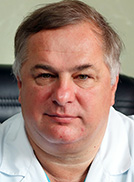Clinical benefit of first-line cemiplimab in patients with locally advanced NSCLC
Despite the fact that the EMPOWER-Lung 1 study previously demonstrated improved efficacy of cemiplimab as compared to chemotherapy in patients with advanced non-small cell lung cancer (NSCLC), little is known on the benefit of PD-L1 inhibitors in locally advanced NSCLC. A recent subgroup analysis of EMPOWER-Lung 1 now demonstrated clinical benefit of first-line cemiplimab monotherapy in patients with laNSCLC with PD-L1 ≥50% without EGFR, ALK or ROS1 mutations.
PD-L1 inhibitors have transformed treatment for patients with metastatic non-small cell lung cancer (NSCLC). However, as approximately one-third of NSCLC diagnoses are classified as locally advanced, there remains an unmet need for novel therapies with improved treatment benefit and an acceptable safety profile for this patient population. Nonetheless, there is paucity of prospective clinical data investigating the use of PD-L1 inhibitors in patients with locally advanced NSCLC (laNSCLC) who are not candidates for definitive concurrent chemoradiotherapy. In the Phase III EMPOWER-Lung 1 Study, cemiplimab, a PD-1 inhibitor, previously demonstrated improved overall survival (OS) and progression-free survival (PFS) in patients with advanced NSCLC and programmed cell death-ligand 1 (PD-L1) expression in ≥50% of tumour cells vs. platinum-doublet chemotherapy. At the 2021 World Conference on Lung Cancer, a post-hoc subgroup analysis of patients with laNSCLC from the PD-L1 ≥50% population in EMPOWER-Lung 1 was presented.
EMPOWER-Lung 1 study design
In EMPOWER-Lung 1, patients with treatment-naïve advanced NSCLC were randomised 1:1 to cemiplimab 350 mg intravenous every 3 weeks or 4-6 cycles of investigator’s choice of platinum-doublet chemotherapy. Eligible patients had an ECOG performance status of 0 or 1 and could not have EGFR, ALK or ROS1 mutations. In the PD-L1 ≥ 50% population of EMPOWER-Lung 1 (N= 563), 87 patients (15.5%) had locally advanced NSCLC (laNSCLC), 45 of them were treated in the cemiplimab arm and 42 in the chemotherapy arm. Of note, patients with laNSCLC were defined as those patients with stage IIIB/IIIC disease who were not candidates for definitive concurrent chemoradiotherapy or had recurred after initial treatment with concurrent chemoradiotherapy.
Study results
In the total laNSCLC population, median age was 63.0 years, 86.2% of patients were male and 36.8% had non-squamous histology. In total, 79.3% had stage IIIB cancer and 20.7% had stage IIIC cancer. After a median follow-up of 11.6 months, median OS was not reached in the cemiplimab arm, as compared to 15.5 months in the chemotherapy arm. Twelve-month OS rates were 78.5% and 57.8% for cemiplimab and chemotherapy, respectively (HR[95%CI]: 0.48[0.20-1.14], p= 0.09). Furthermore, the risk of disease progression or death reduced by 51% in the cemiplimab arm (median PFS 8.4 vs. 6.2 months, HR[95%CI]: 0.49[0.27-0.88], p= 0.02). One-year PFS rates were 38.5% and 5.8%, respectively. Objective response rates were numerically higher for patients treated with cemiplimab than for patients receiving chemotherapy (44.4% vs. 31.0%, Odds ratio[95%CI]: 1.8[0.7-4.2], p= 0.20). Finally, Kaplan-Meier estimated duration of response was 12.5 months for cemiplimab and 6.2 months for chemotherapy.
Conclusion
In this post-hoc subgroup analysis from EMPOWER-Lung 1, patients with locally advanced NSCLC and with PD-L1 ≥50% demonstrated improved survival benefits with first-line cemiplimab monotherapy compared with chemotherapy. These results support clinical benefit provided by cemiplimab first-line monotherapy for patients with locally advanced NSCLC and with PD-L1 ≥50% without EGFR, ALK, or ROS1 driver mutations who are not candidates for definitive concurrent chemoradiotherapy.
Reference
Bondarenko I, Sezer A, Kilickap S, et al. Clinical Benefit of First-Line Cemiplimab in Patients with Locally Advanced NSCLC: Subgroup Analysis from EMPOWER-Lung 1. Presented at the 2021 World Conference on Lung Cancer; Abstract FP04.03.

